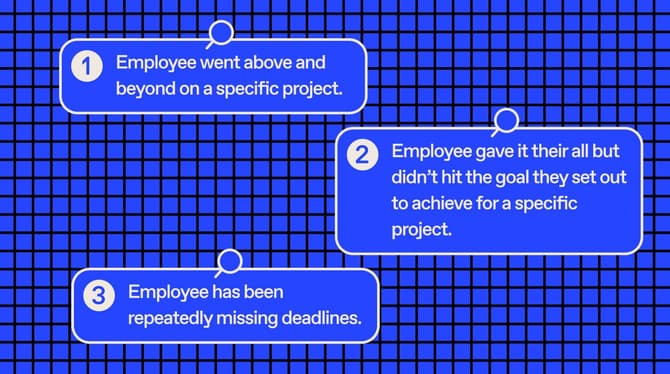In the era of distributed work, keeping a pulse on your team may seem difficult or even tedious. In-person chats are less frequent, and part of your team is likely scattered around the country (or even the world). The ever-changing landscape of work can take a toll on engagement, motivation, alignment, camaraderie, and more if not assessed and addressed early on.
Traditionally, bulky annual surveys were used to evaluate employee engagement. But in this fast-paced environment, the modern employee is now looking for a much more responsive system. Enter employee engagement pulse survey questions: the quick and easy way to gather regular insights on your team's standings.
In this article, we outline the basics of pulse survey questions and provide you with 25 examples to test out in your next employee engagement survey.
Exclusive online summit
·
May 23 2024
Moments that matter: how to seed great work
What's in this article
- Types of pulse survey questions to ask employees
- Top 20 employee pulse survey questions by category
- How to interpret employee pulse survey responses
- How often should you run employee pulse surveys?
- How long should a pulse survey be?
- You've sent out your pulse survey; what now?
- Take the guesswork out of creating pulse surveys with Officevibe
Types of pulse survey questions to ask employees
Your survey questions can be structured differently depending on the kind of information you're looking to gather. Start by asking yourself the right questions: do you want to quantify how employees are feeling with easy data analyses, or do you need more detailed information to follow up?
Quantitative pulse survey questions
For the former, you'll want to include quantitative questions with a predetermined set of responses. These can be true or false, multiple choice answers, or opinion scales (ex: strongly agree-strongly disagree). Quantitative questions are quick to answer and will help you measure employee engagement with the click of a button.
Qualitative pulse survey questions
With qualitative pulse survey questions, open-ended prompts will give your team the liberty to answer as they wish. Keeping these questions anonymous is a good idea, as you'll likely get more candid responses. This will encourage them to expand on their previous answers and possibly uncover successes or issues you weren't fully aware of.
💡Great employee pulse surveys should feature a mix of both quantitative and qualitative questions. Complementing easy-to-measure answers with more in-depth responses will help you keep a better pulse on your team while tracking important trends.
Top 20 employee pulse survey questions by category
At Officevibe, we've uncovered 10 metrics that every manager should measure to assess employee engagement. The following pulse survey questions are broken down by each category:
Questions about ambassadorship
Ambassadorship is a huge employee engagement identifier. It's simple: when an employee feels proud of their job, they're more likely to be motivated, productive, and loyal. A loyal employee is not only more likely to stay at the organization in the long run, but they also act as brand ambassadors, which helps attract and retain stellar talent.
By measuring ambassadorship with pulse surveys, you can also figure out what your employees love about your company culture, and what needs care and attention.
Here are a few questions you can ask to measure your employee’s ambassadorship:
- I am proud of the value we create at work.
- How likely are you to recommend your organization to a friend or peer looking for work?
Questions about alignment
Alignment is all about being on the same page, whether it comes to objectives, culture, or vision. An organization's success is greater than the sum of its parts when every team works together towards common goals and missions.
And while this may seem like common sense, Officevibe data shows that a shocking 73% of employees think that their manager could define more precise goals. Identifying this lack of clarity and sense of direction using pulse surveys can help decrease stress, confusion, and disengagement before they become a real problem.
Here are a few questions you can ask to measure how aligned your team feels with the organization's mission, vision, and values:
- Do you feel that your personal goals align with your company’s overall strategy?
- Do your personal beliefs align with the company values?
Questions about feedback
Employees can only truly thrive in their roles if they receive the right feedback at the right time. But how can you tell if the feedback you are giving is being well-received? Adding a few questions about feedback in your employee pulse survey can give you anonymous insights your team may not feel comfortable giving otherwise.
Here are a few questions you can ask to measure how your employees feel about the quality and frequency of feedback they receive:
- Do you feel you receive enough feedback?
- Are you happy with the type of feedback you receive from your manager?
Questions about employee happiness
Happy employees make for successful teams and companies. And while you don't have control over your team's happiness as a manager, there are definitely ways you can help foster it.
Considering people spend a third of their day at work, making sure the environment is a positive one can have a big impact on a person's happiness levels. Pinpointing any problem areas that may cause unpleasant feelings towards work is also just as important when boosting this metric.
Here are a few questions you can ask to measure your employee’s happiness levels:
- On a scale of 1 to 10, how happy do you feel at work?
- Do you feel a sense of fulfillment from your work?
Questions about personal growth
Personal growth, measured by autonomy, mastery, and purpose, is often a huge gap in the employee experience. But prioritizing it in your EX plan can make all the difference in your employee retention.
The key is identifying how your employees want to grow and what you can do as their manager to support them in their growth.
Only 60% of employees state that they have a development plan to improve their skills.
Officevibe Pulse Survey Data
Here are a few questions you can ask to measure your team’s satisfaction with their personal growth:
- Do you have the resources you need to grow in your role?
- Do you see yourself reaching your career goals in your current organization?
Questions about recognition
Having a culture of recognition in the workplace can make all the difference in overall job satisfaction. Feeling valued and recognized for what you bring to the table is simply human nature. But giving meaningful recognition gets swept under the rug far too often in today's day and age.
Including recognition questions in your employee pulse surveys is a great way to uncover how your team feels about recognition, what kind of recognition works well for each person, and how often you should be giving it.
Here are a few questions you can ask to measure how content your team is with the recognition they receive:
- Are you currently happy with the frequency of recognition you receive?
- Is the recognition you receive meaningful to you?
Questions about employee-manager relationships
An employee's relationship with their manager can make or break their employee experience. In fact, according to Officevibe data, 75% of employees who display low engagement levels or leave their jobs say that it’s due to their manager or leadership.
The good news is that, as a manager, you're in the driver's seat when it comes to this metric. Using pulse surveys, you can continuously identify ways to improve your relationship with employees and reassess your management style as needed.
Here are a few questions you can ask to measure your employee’s relationship with yourself or their manager:
- On a scale of 1-10, how satisfied are you with the number of touchpoints you have with your manager?
- Do you feel that your manager sets you up for success in your role?
Questions about relationships with peers
Just like employee-manager relationships, relationships with peers should be in good standing for teams to work at their best. This includes having great lines of communication, fostering peer-to-peer trust, and building team collaboration.
Here are a few questions you can ask to measure your team’s peer-to-peer relationships:
- Do you enjoy working and collaborating with your peers?
- Do you feel you have an open line of communication with your peers?
Questions about employee satisfaction
Employee satisfaction is all about how a person feels about their role in their company, and everything encompassing it. This can include factors like compensation, tools and resources, and responsibilities. Even understanding if they feel they are part of the right team can be important to determining an employee's satisfaction levels.
Here are a few questions you can ask to measure to measure employee satisfaction:
- Do you feel you are fairly compensated in your current role?
- On a scale of 1-10, how satisfied are you with your daily responsibilities?
Questions about wellness
If there is one thing the last few years taught us, it's that wellness at work cannot be ignored. With remote work blurring the lines between home and work, managers have a responsibility to ensure the well-being of their team members.
This can include checking in on people's mental and physical health, or ensuring they have a good work-life balance. Pulse surveys give employees a great outlet to express themselves on how they're feeling at work.
47% of people say they regularly feel overwhelmed at work.
Officevibe Pulse Survey Data
Here are a few questions you can ask to measure your team’s wellness:
- I feel that I can maintain a healthy balance between work and my personal life.
- I believe my company takes diversity and inclusion seriously.
How to interpret employee pulse survey responses
We've covered some of the most useful employee pulse survey questions, but knowing which questions to ask is half the battle; to make the most of your employee surveys and gain insight, you need to know how to interpret your team's responses.
We put together a few examples with different response scales to show you how diverse your employee pulse survey questions can be.
Example 1: Would you recommend your organization as a great place to work?
What this question tells you: Asking your employees if they'd recommend your company to their friends or people in their network can help you measure their levels of ambassadorship. This question can also help you identify which employees feel proud and engaged at work and those that are considered detractors.
Response scale: This question can be answered on a scale of 1 to 10, allowing you to easily measure your employee Net Promoter Score, a metric for determining ambassadorship, employee engagement, and satisfaction.
Example 2: I feel that my work contributes to my organization’s broader goals.
What this question tells you: Measuring the alignment metric, this question will help you identify if employees understand the "why" behind their daily work. It'll help you make sure everyone is rowing in the same direction.
Response scale:
- Strongly disagree
- Disagree
- Neutral
- Agree
- Strongly agree
Example 3: How would you rate the frequency at which you receive recognition?
What this question tells you: Asking questions about recognition will tell you if employees feel seen and valued for their hard work. Scoring poorly on these questions is a sign that your culture of recognition needs attention.
Response scale: Rating from 1 to 5 stars.
Example 4: Which of the following best describes the amount of feedback you typically get regarding your work?
What this question tells you: Asking your manager or peers for feedback can be tough and sometimes intimidating. So, including a question like this one in your pulse survey can give employees an easy way to flag whether or not they are satisfied with the feedback they receive.
Response scale:
- Completely inadequate
- Inadequate
- Adequate
- Completely adequate
Example 5: On a scale from 1-10, how reasonable is your workload?
What this question tells you: This question will help you measure your wellness metric by evaluating whether your team members feel at ease, overwhelmed, or anywhere in between with their workload.
Response scale: Slider from 1 to 10, 1 being very unreasonable and 10 being very reasonable.
How often should you run employee pulse surveys?
Pulse surveys do exactly what their name suggests: they help you get a pulse on how your team is doing and how your employees feel on a regular basis. Great employee pulse surveys should be concise and should only take a couple of minutes to fill out. Making them an easy and virtually effortless task will help you up the frequency and give you a real-time feel on how your team is doing.
At Officevibe, we suggest sending employee engagement surveys on a weekly or bi-weekly basis. With this frequency, managers can gather quick and instant feedback, allowing them to be nimble in their management.
Pro-tip: If your pulse survey results highlight an area of concern, consider increasing the frequency to once a week until you see a noticeable improvement in your trends.
How long should a pulse survey be?
The rule of thumb when deciding on your survey length is that the more questions people have to fill out, the less likely they are to complete the survey or answer it together. Aside from affecting response rates, long surveys can also fall victim to low-quality answers. Those who do fill out the entire survey are likely to speed through the questions to save time.
If you're sending them out on a weekly basis, we've found that the sweet spot for a good employee pulse survey is 5 questions. For a bi-weekly employee engagement survey, you can increase this to 5-10 questions.
You've sent out your pulse survey; what now?
Curating your employee survey questions and sending them out are the first steps to kickstarting your journey towards bettering your employee engagement. From there, all you have to do is analyze your employee survey results and take action.
Learn to interpret the results and track the data
Your employee pulse survey results will be filled with a ton of golden nuggets of information. First, your overall engagement score will give you the big picture of how your team is doing. From there, you can pinpoint exactly which areas your team is thriving in, and those that need improvement by tracking your metrics and submetrics scores.
As you start making pulse surveys a part of your regular activities, you'll get a chance to track trends and changes in the data to help you better direct your attention.
Pro-tip: Your engagement scores are impacted by multiple factors, many of which are out of your control as a manager. These can include seasonality, company context, and industry trends.
Create an action plan based on your pulse survey results
Building your employee feedback game plan doesn't have to be daunting. These easy pointers will get you on the right track and ensure your feedback surveys are as effective as possible:
- Share pulse survey results and discuss them with your team
- Brainstorm ideas as a team to address any points
- Create employee experience goals to hold yourself accountable
- Keep track of employee engagement levels and take note of any noticeable changes
- Maintain a constant communication loop with your team members
- Send follow-up pulse survey questions as needed
Unsure what to send as your next pulse survey? Dig deeper into specific topics by choosing a survey template from our bank of customizable polls.
Take the guesswork out of creating pulse surveys with Officevibe
If they aren't already, pulse survey questions should be a part of your employee experience arsenal as a manager. And with the right tools, kickstarting your pulse survey journey can be easy and breezy.
Officevibe's Pulse Surveys offer a safe space for employees to give meaningful feedback about their work, team, and organization. With automated weekly, bi-weekly, or monthly sends, as well as easy-to-read reports, these pulse surveys are a manager's ultimate sidekick.
Designed with a mix of a slider, rating, multiple choice, and open-ended questions, you'll be regularly generating fresh insights while keeping your team as engaged as possible.
Ready to get your pulse on? Sign up and try Officevibe for free today!



